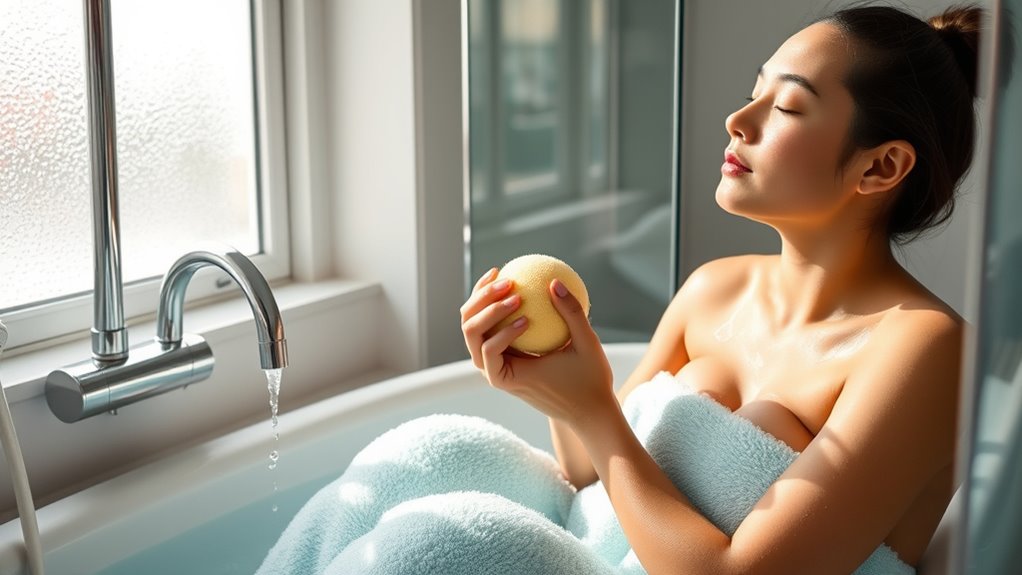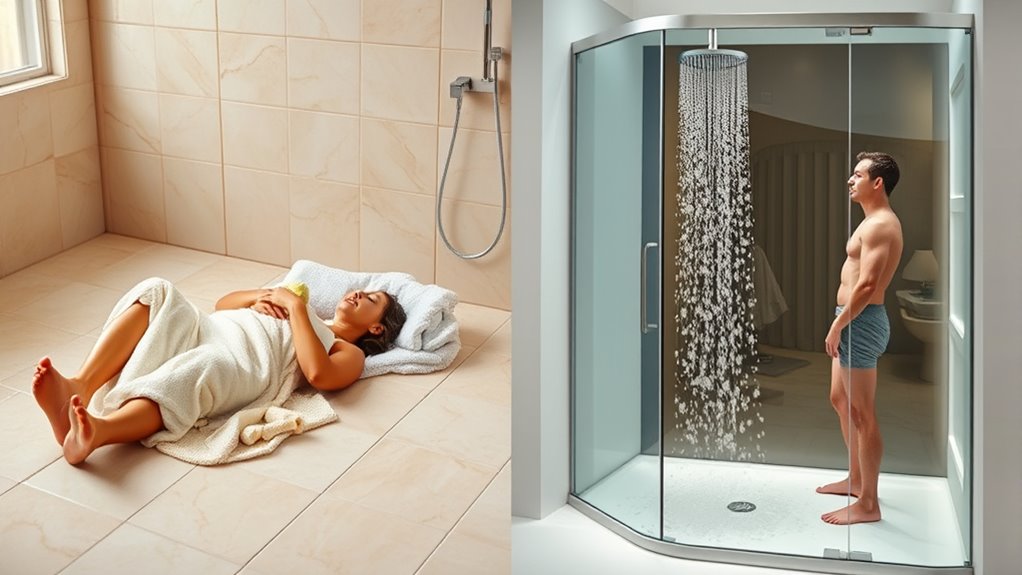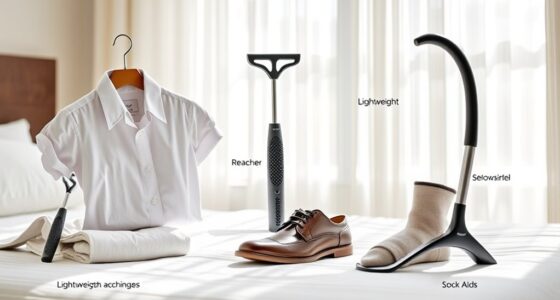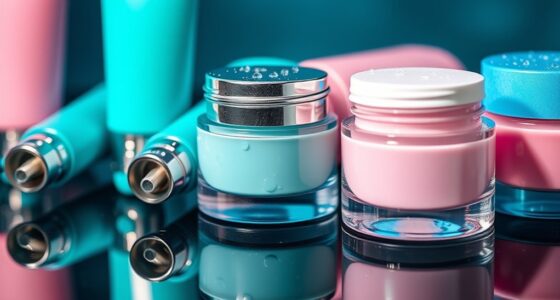Choosing between a sponge bath and a shower depends on your priorities. Sponge baths use less water, making them eco-friendly and gentle on sensitive skin, but they might miss hard-to-reach areas. Showers clean quickly and thoroughly, ideal for busy mornings, but can use more water and cause skin dryness if not managed properly. Both methods have benefits and drawbacks—exploring further can help you pick the best option for your needs.
Key Takeaways
- Sponge baths use less water and are eco-friendly, ideal for drought-prone areas or conserving resources.
- Showers provide quicker, more thorough cleaning of the entire body, saving time for busy schedules.
- Sponge baths are gentler on skin, reducing irritation, especially for sensitive skin types.
- Showers can strip natural oils if too hot or long, potentially causing skin dryness.
- Both methods can be environmentally friendly and skin-conscious when practiced with water and temperature moderation.
Advantages and Disadvantages of Sponge Baths

While sponge baths offer a practical alternative to showers, they come with both benefits and limitations. One advantage is water conservation; since you use less water, it’s an eco-friendly choice, especially in drought-prone areas. Additionally, sponge baths are gentle on your skin, reducing the risk of skin irritation, which can occur from prolonged exposure to water and soap in showers. However, sponge baths may not thoroughly clean hard-to-reach areas, potentially leaving germs behind. They also tend to be more time-consuming and less convenient when you’re trying to refresh quickly. For individuals with sensitive skin, sponge baths can help prevent irritation, but they might not be sufficient for deep cleaning. Moreover, they can promote better organization of bathing supplies, making the process more efficient. Overall, they’re a good option for conserving water and reducing skin irritation, but with some trade-offs.
Benefits and Drawbacks of Taking Showers

Taking showers offers a quick and effective way to clean your entire body, making it convenient for busy schedules. However, they can also impact your skin hydration if not done properly. Here are some benefits and drawbacks to contemplate:
- Efficient cleaning: Showers remove dirt and sweat quickly, helping you feel fresh.
- Skin hydration concerns: Long or hot showers can strip your skin of natural oils, leading to dryness.
- Water conservation: Shorter showers save water, making them more environmentally friendly.
- Proper water temperature and duration can prevent skin damage and promote better toilet maintenance.
While showers are practical, it’s important to balance their benefits with potential skin and environmental impacts. Using lukewarm water and limiting shower time can help preserve your skin’s moisture and conserve water.
Frequently Asked Questions
Which Method Is More Suitable for Elderly or Disabled Individuals?
When caring for elderly or disabled individuals, you should consider their mobility and use assistive devices to guarantee safety. A sponge bath might be more suitable if they have limited mobility or balance issues, as it’s less demanding and reduces fall risk. If they can stand and move safely, a shower with grab bars and non-slip mats offers a quicker, more thorough clean. Always prioritize comfort and safety based on their specific needs.
How Do Sponge Baths Impact Skin Hydration Compared to Showers?
Sponge baths generally better preserve your skin’s moisture and hydration levels because they involve less exposure to water and harsh soaps. Unlike showers, which can strip natural oils and cause dryness, sponge baths help you maintain healthier, more hydrated skin. By gently cleaning your skin without prolonged water contact, you support ideal skin moisture, reducing dryness and irritation, especially important for sensitive or elderly skin.
Are Sponge Baths More Hygienic Than Showers in Certain Situations?
In certain situations, sponge baths can be more hygienic than showers, especially when water conservation matters or you’re dealing with skin irritation. Using a sponge allows you to target specific areas without excessive water use, reducing the risk of skin irritation from prolonged exposure to water and soap. Plus, it helps conserve water, making it a practical choice for conserving resources while maintaining cleanliness.
Can Sponge Baths Replace Showers for Daily Hygiene?
Imagine starting your day feeling fresh and clean, with water softly lapping your skin. While sponge baths can maintain personal hygiene and conserve water, they aren’t practical for replacing daily showers. Showers thoroughly cleanse your entire body, removing sweat and dirt efficiently. Sponge baths work well in emergencies or for quick refreshes, but for complete hygiene, regular showers are more effective and necessary to keep you truly clean and feeling your best.
What Are the Environmental Impacts of Sponge Baths Versus Showers?
When comparing sponge baths and showers, consider their environmental impacts on water conservation and energy consumption. Sponge baths use markedly less water, helping conserve resources, and require minimal energy since there’s no need to heat large amounts of water. Showers, especially long ones, consume more water and energy to heat that water. By choosing sponge baths when possible, you reduce your ecological footprint and support sustainable water and energy use.
Conclusion
Choosing between a sponge bath and a shower depends on your needs. For instance, if you’re recovering from surgery, a sponge bath might be gentler and more manageable. But if you want a quick, thorough clean, a shower is typically better. Think of Sarah, who switched to sponge baths during her ankle injury—she found it easier to maintain hygiene without risking further pain. Ultimately, weigh the pros and cons to find what keeps you clean and comfortable.









